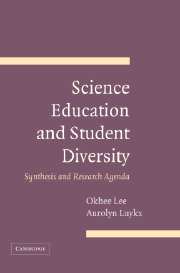Book contents
- Frontmatter
- Contents
- Foreword by Roland G. Tharp
- Acknowledgments
- Introduction
- SECTION I CONCEPTUAL GROUNDING AND POLICY CONTEXT
- 1 Student Diversity and Science Outcomes
- 2 Conceptual Frameworks and Educational Policies
- SECTION II STUDENT LEARNING AND CLASSROOM PRACTICES
- SECTION III CREATING EQUITABLE LEARNING ENVIRONMENTS
- SECTION IV CONCLUSIONS AND A RESEARCH AGENDA
- Appendix: Method for Research Synthesis
- References
- Index
2 - Conceptual Frameworks and Educational Policies
Published online by Cambridge University Press: 04 December 2009
- Frontmatter
- Contents
- Foreword by Roland G. Tharp
- Acknowledgments
- Introduction
- SECTION I CONCEPTUAL GROUNDING AND POLICY CONTEXT
- 1 Student Diversity and Science Outcomes
- 2 Conceptual Frameworks and Educational Policies
- SECTION II STUDENT LEARNING AND CLASSROOM PRACTICES
- SECTION III CREATING EQUITABLE LEARNING ENVIRONMENTS
- SECTION IV CONCLUSIONS AND A RESEARCH AGENDA
- Appendix: Method for Research Synthesis
- References
- Index
Summary
This research synthesis is framed by conceptual considerations, discussed in this chapter, as well as by methodological approaches (see Appendix). Three conceptual and policy issues that guide the work reviewed here are: (a) perspectives on the epistemology of science, that is, what counts as science and school science; (b) theoretical perspectives guiding the research literature; and (c) the policy context of high-stakes assessment and accountability.
Views of Science: Is Science Independent of Culture?
One strand of the debate over science education among diverse student groups has focused on epistemological questions, such as “What counts as science?” and “What are scientific ways of knowing?” The definition of science is “a de facto ‘gatekeeping’ device for determining what can be included in a school science curriculum and what cannot” (Snively & Corsiglia, 2001, p. 6; also see Cobern & Loving, 2001; Loving, 1997; Siegel, 2002; Stanley & Brickhouse, 1994, 2001).
The core of this epistemological debate involves universal versus multicultural views of science (Brickhouse, 1994; Cobern & Loving, 2001; Loving, 1997; Siegel, 1995, 2002; Snively & Corsiglia, 2001; Southerland, 2000; Stanley & Brickhouse, 1994). “Science” has traditionally been equated with Western science over the last 500 years (AAAS, 1989, p. 136, and 1993; NRC, 1996). This definition conceives of science in universal terms – “Science assumes that the universe is, as its name implies, a vast single system in which the basic rules are everywhere the same.
- Type
- Chapter
- Information
- Science Education and Student DiversitySynthesis and Research Agenda, pp. 23 - 30Publisher: Cambridge University PressPrint publication year: 2006



